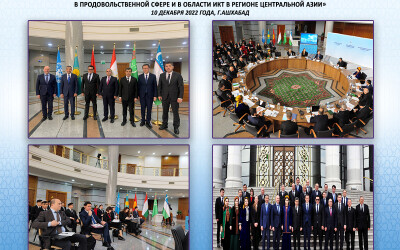ISRS: Strengthening dialogue and trust between Central Asian countries is a key condition for solving regional problems
Ashgabat hosted the Central Asian Expert Forum (CAEF) on “Current aspects of regional cooperation on climate change, water use, food security and ICT in the Central Asian region”.
The participants exchanged views on the issues of interaction in the region in the context of mitigation and adaptation to the negative effects of climate change, rational use of water resources, ensuring food and information security.
First Deputy Director of the Institute for Strategic and Regional Studies under the President of the Republic of Uzbekistan Akramjon Nematov noted the role and importance of the Central Asian Expert Forum for consolidating the efforts of the region, taking coordinated measures on a wide range of issues that are inextricably linked to ensuring the stability and prosperity of Central Asia.

According to him, the CAEF, the first meeting of which was held at the initiative of Uzbekistan on October 29-30, 2018 in Tashkent, in a short time has become a popular platform that unites the efforts of the Central Asian countries to maintain regular dialogue on the most pressing issues of sustainable development, stability and security in the region.
Mr. Nematov drew attention to several problems that today require joint efforts and the development of solutions, in particular in climate change, from which Central Asia is currently increasingly experiencing negative consequences.
Taking into account that water is a strategic resource, and at the same time the basis of sustainable development, the need to unite the efforts of the region to address issues of transboundary water use is becoming increasingly important.
As Akramjon Nematov noted, more effective cooperation in water resources management will contribute to the socio-economic development of the region. According to the World Bank forecasts, the implementation of effective water policies in Central Asia will lead to a GDP growth of 6% by 2050.
The expert emphasized that the issues of combating climate change are of a transboundary, global nature. In this regard, the Central Asian countries should consolidate and take an active part in global efforts to mitigate the negative consequences of climate change and keep the average temperature increase within 1.5 degrees.
The event, organized by the Institute of International Relations of the Ministry of Foreign Affairs of Turkmenistan jointly with the UN Regional Centre for Preventive Diplomacy for Central Asia (UNRCCA), was attended by the Head of the UN Regional Centre for Preventive Diplomacy for Central Asia (UNRCCA) Natalia Gherman, heads and leading experts of strategic research institutions, think tanks of Central Asian countries.
Next

It is important for the states of Central Asia to jointly form a regional agenda to solve problems, First Deputy Director of the Institute for Strategic and Interregional Studies under the President of the Republic of Uzbekistan Akramjon Nematov said during the next Central Asian Expert Forum (CAEF) "Actual aspects of regional cooperation on climate change...
12.12.2022






